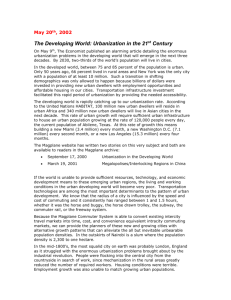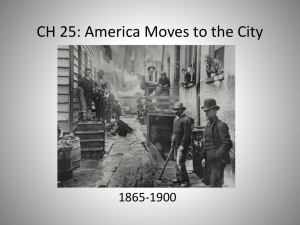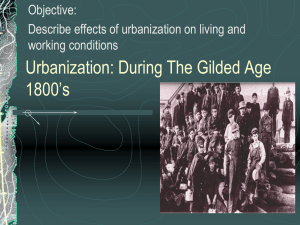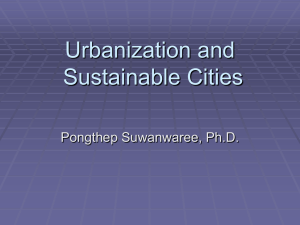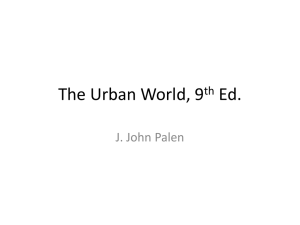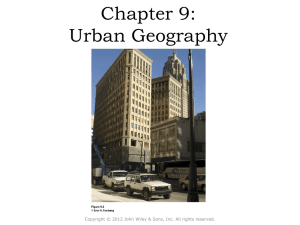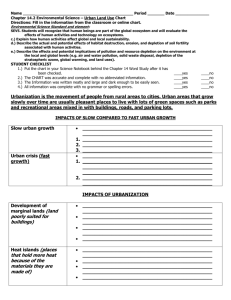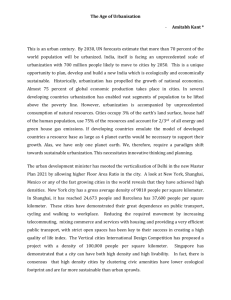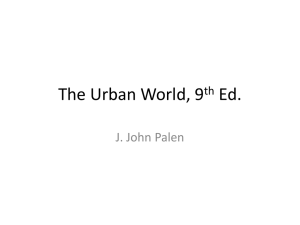Country Planning, Urbanization and Construction, Law on
advertisement
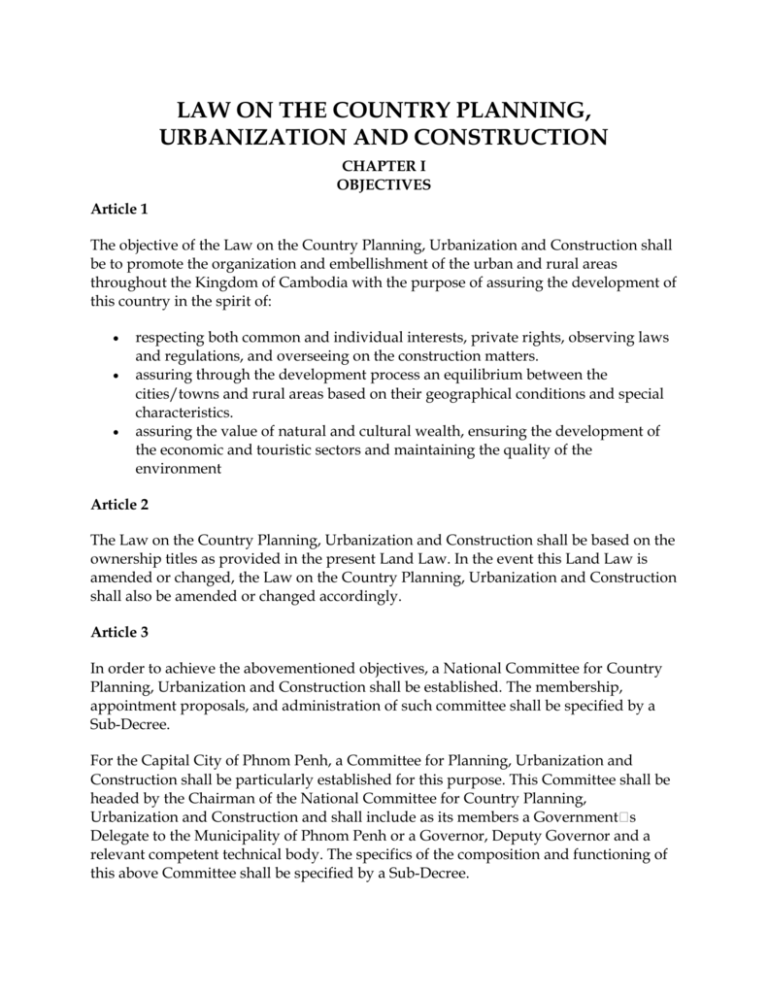
LAW ON THE COUNTRY PLANNING, URBANIZATION AND CONSTRUCTION CHAPTER I OBJECTIVES Article 1 The objective of the Law on the Country Planning, Urbanization and Construction shall be to promote the organization and embellishment of the urban and rural areas throughout the Kingdom of Cambodia with the purpose of assuring the development of this country in the spirit of: respecting both common and individual interests, private rights, observing laws and regulations, and overseeing on the construction matters. assuring through the development process an equilibrium between the cities/towns and rural areas based on their geographical conditions and special characteristics. assuring the value of natural and cultural wealth, ensuring the development of the economic and touristic sectors and maintaining the quality of the environment Article 2 The Law on the Country Planning, Urbanization and Construction shall be based on the ownership titles as provided in the present Land Law. In the event this Land Law is amended or changed, the Law on the Country Planning, Urbanization and Construction shall also be amended or changed accordingly. Article 3 In order to achieve the abovementioned objectives, a National Committee for Country Planning, Urbanization and Construction shall be established. The membership, appointment proposals, and administration of such committee shall be specified by a Sub-Decree. For the Capital City of Phnom Penh, a Committee for Planning, Urbanization and Construction shall be particularly established for this purpose. This Committee shall be headed by the Chairman of the National Committee for Country Planning, Urbanization and Construction and shall include as its members a Government’ s Delegate to the Municipality of Phnom Penh or a Governor, Deputy Governor and a relevant competent technical body. The specifics of the composition and functioning of this above Committee shall be specified by a Sub-Decree. For the provinces and other municipalities, a Sub-Committee for Planning, Urbanization and Construction shall be respectively established. Each Sub-Committee shall be headed by a Governor of the province or Chief of the municipality and shall include as its members and a relevant competent provincial/municipal technical body as its members. The specifics of the composition and functioning of this provincial or municipal Sub-Committee shall be determined by a decision of the Chairman of the National Committee for Country Planning, Urbanization and Construction, upon approval from such National Committee. CHAPTER II DOCUMENTS RELATED TO THE COUNTRY PLANNING, URBANIZATION AND CONSTRUCTION Article 4 All documents related to the Country Planning, Urbanization and Construction shall be classified according to each specific case, and according to the particular conditions of the land of each province, municipality and region, in the spirit of protecting the patrimony, the environment and the natural resources as well as the development of the economy. Article 5 The Committee for Planning, Urbanization and Construction of the Municipality of Phnom Penh or the Subcommittee for Planning, Urbanization and Construction of each province and municipality, shall respectively draw up their own development masterplans for the reorganization and development of their respective city, province and municipality. Such development master-plans shall be approved by the National Committee Country Planning, Urbanization and Construction and shall be determined by a Sub-decree. In order to protect the patrimony and the environment, and to assure the economic development of any particular region as determined by the Council of Ministers, the National Committee for Country Planning, Urbanization and Construction, shall have the duty to prepare a specific development master-plan for such special region and submit it to the Council of Ministers for decision. CHAPTER III LAND USE MASTER PLAN Article 6 Land use master plans shall be established for each capital city, province and municipality. Private entities and public authorities shall strictly adhered to such master plans during their construction works. Article 7 Land use master plans shall clearly indicate the areas to be allocated for national defense, agriculture, commerce, industry, handicraft, culture, tourism, religion, and administrative and public facilities. These plans shall also specify the possibility for constructions. Article 8 Land use master plans shall comply with the development master-plans as stated in the Article 5 of this law. Article 9 Land use master plans for each capital city, province and municipality, shall be first approved by the Committee for Planning, Urbanization and Construction of the Capital City, or by the Sub-Committees for Planning, Urbanization and Construction of each province or municipality, and shall be approved subsequently by the National Committee for Country Planning, Urbanization and Construction. Private entities and pubic authorities shall strictly adhered to such Land use master plans. Article 10 The Royal Government will set up special provisions and the services of urbanization for protecting and promoting the value of resort places or of any immobile objects which shall provide advantages in archeology, history, culture, beauty (aesthetic)-or technic. The list of those immobile objects or resort places shall be determined by a Subdecree. The modification, the reform and the administration of those immobile objects and resort places shall be determined by the Law on the Protection of the Patrimony. The special provisions and the services of urbanization for the protection and promotion of the value of the resort places or immobile objects which provide advantages in archaeology, history, culture, beauty or technic must be inscribed in the master plans for the organization of land and urbanization and development and in plans of the use of land and constructions. The royal government shall determined in a subDecree the list of immobile objects which will yield advantages in archaeology, history, culture and technic to assure the administration of those immobile objects in compliance with the provisions of the Law on the Protection of the Patrimony. CHAPTER IV WORK AND CONSTRUCTION Article 11 All the explorations or surveys which produce an effect on archaeology shall be firstly authorized by the Royal Government. In every construction process in case encountering any object which gives values or advantages in archaeology or history, the supervisor of the construction shall be obliged to report to competent authority. After receiving the report, the competent authority has to immediately stop the construction immediately. Article 12 All individuals and private institutions as well as public authority are banned from conducting any constructions on the public yard-field or lands as defined hereunder: water reservoir and water dams. the reserved mining fields the forest zones. the archaeological and historical resort sites. the gardens and public parks and development zones. reserved land for the road constructions or reserved land for the road-sides, and the reserved land for the construction of rail-roads and airports. rivers, seas,. streams including banks. Conditions of administration of those zones and conditions of light constructions and temporary small structures shall be determined in a sub-decree. Article 13 The work of construction and the settlement shall be conducted in obedience with all documents relating to the organization of territory, urbanization and construction and to the master plans mentioned in the Articles 4 and 5 of this Law. This law was adopted by the National Assembly on May 24, 1994, during its 2nd Session of the First Legislature. The Acting Chairman of the National Assembly Loy Sim Chheang
